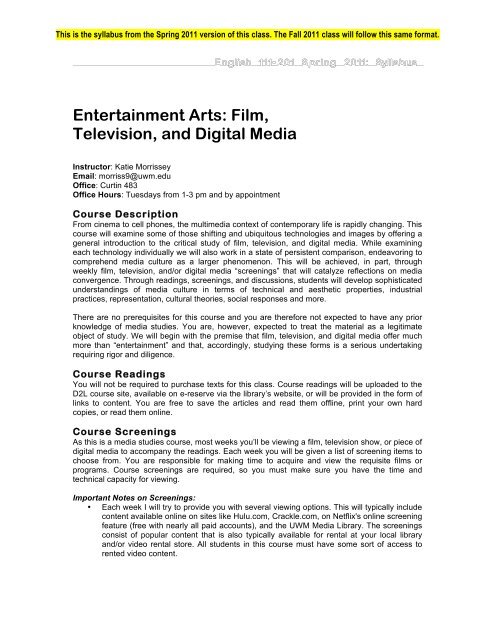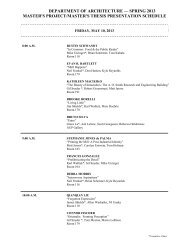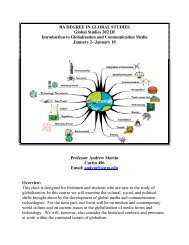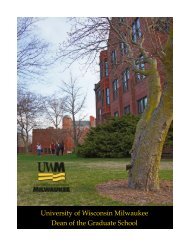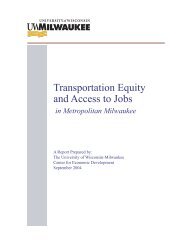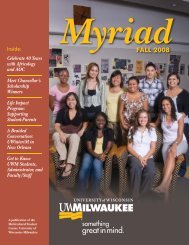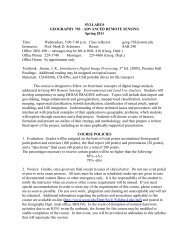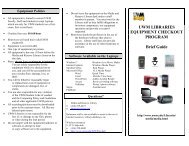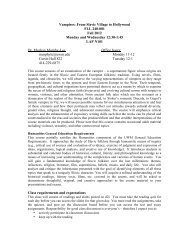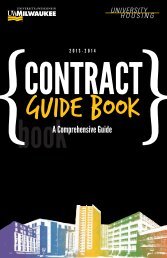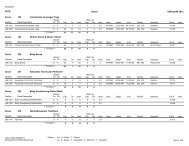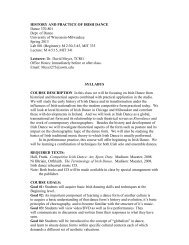English 111 â Syllabus Spring 2011
English 111 â Syllabus Spring 2011
English 111 â Syllabus Spring 2011
- No tags were found...
Create successful ePaper yourself
Turn your PDF publications into a flip-book with our unique Google optimized e-Paper software.
This is the syllabus from the <strong>Spring</strong> <strong>2011</strong> version of this class. The Fall <strong>2011</strong> class will follow this same format._________<strong>English</strong> <strong>111</strong>-201 <strong>Spring</strong> <strong>2011</strong>: <strong>Syllabus</strong>Entertainment Arts: Film,Television, and Digital MediaInstructor: Katie MorrisseyEmail: morriss9@uwm.eduOffice: Curtin 483Office Hours: Tuesdays from 1-3 pm and by appointmentCourse DescriptionFrom cinema to cell phones, the multimedia context of contemporary life is rapidly changing. Thiscourse will examine some of those shifting and ubiquitous technologies and images by offering ageneral introduction to the critical study of film, television, and digital media. While examiningeach technology individually we will also work in a state of persistent comparison, endeavoring tocomprehend media culture as a larger phenomenon. This will be achieved, in part, throughweekly film, television, and/or digital media “screenings” that will catalyze reflections on mediaconvergence. Through readings, screenings, and discussions, students will develop sophisticatedunderstandings of media culture in terms of technical and aesthetic properties, industrialpractices, representation, cultural theories, social responses and more.There are no prerequisites for this course and you are therefore not expected to have any priorknowledge of media studies. You are, however, expected to treat the material as a legitimateobject of study. We will begin with the premise that film, television, and digital media offer muchmore than “entertainment” and that, accordingly, studying these forms is a serious undertakingrequiring rigor and diligence.Course ReadingsYou will not be required to purchase texts for this class. Course readings will be uploaded to theD2L course site, available on e-reserve via the library’s website, or will be provided in the form oflinks to content. You are free to save the articles and read them offline, print your own hardcopies, or read them online.Course ScreeningsAs this is a media studies course, most weeks you’ll be viewing a film, television show, or piece ofdigital media to accompany the readings. Each week you will be given a list of screening items tochoose from. You are responsible for making time to acquire and view the requisite films orprograms. Course screenings are required, so you must make sure you have the time andtechnical capacity for viewing.Important Notes on Screenings:• Each week I will try to provide you with several viewing options. This will typically includecontent available online on sites like Hulu.com, Crackle.com, on Netflix's online screeningfeature (free with nearly all paid accounts), and the UWM Media Library. The screeningsconsist of popular content that is also typically available for rental at your local libraryand/or video rental store. All students in this course must have some sort of access torented video content.
_________ <strong>English</strong> <strong>111</strong>-201 <strong>Spring</strong> <strong>2011</strong>: <strong>Syllabus</strong>• I do not require students to have a Netflix account for this class, but it is stronglyrecommended. You may want to consider temporarily signing up for one of their basicaccounts (typically $5-8 a month) for the duration of this class. Or, you might want to askaround and see if a friend has an account you can share. Like I said, I will try to provideyou with multiple viewing options, but having a Netflix account will definitely make yourlife easier.• If you aren't near the UWM Library and want to keep your costs down, check out yourlocal public library. You'd be amazed at how many films they have. (Also, tip: These daysyou can usually log into the library's website and reserve films for yourself in advance.)• When discussing film and television, you may also be asked to go to a movie theater towatch a film or turn on a television and watch content as it is broadcast live (commercialsand all ). When we focus on digital media, you may need to visit websites that requireyou to download and install plug-ins (i.e. Quicktime, Flash, etc.) to view their content. Ifyou think you may have problems doing any of these things, be sure to contact me thefirst week of class so we can discuss it.AssignmentsDiscussion and ParticipationAs an online course, this class relies heavily on the active participation of all students. Eachweek, most of our time will be spent discussing the readings and screenings. To fully participatein the course and to get the most out of it, you must take the time to reach through all posts andcomments. (Just FYI, D2L lets me see who does and does not read each post.) Regularly readingand responding will help you with the course material. Just as importantly, your contributions willalso allow you to help others in the class, as all of you work together to flush out an idea orhammer through a challenging question.As an online class, you will find yourself writing a lot in this course. With each of our study units(film, tv, digital media), you will find yourself writing several pages worth of comments and posts. Iwill provide guidelines to help you with creating your posts and to give you a sense of theappropriate tone for our discussions. At the beginning of the semester, I will also give youfeedback on your posts and comments so that you have a sense of what's expected.Reading and Screening NotesEach week you are expected to take notes as you read and watch the weekly assignments.These notes need to be uploaded to D2L by 11 pm each Tuesday. (If you prefer to take notes byhand, instead of typing them in a document, you may scan your handwritten notes and uploadthem as a pdf file.)EssaysYou will write three short essays this semester, one for each of the three study units (film, tv,digital media). These essays should be 4-5 pages long (double-spaced), use a standard sizedfont and follow the MLA style of citation and formatting. The essays will assess yourunderstanding of the theories, methods, trends, histories, and styles that will be presented to youthrough lectures, readings, and screenings.All work in this class must be your own. Any material or ideas taken from another person must beappropriately cited and contextualized. Failure to do these things will be considered an act ofplagiarism and will lead to failure in the class.Be warned, plagiarism is a serious offense under UWM's code of ethics and has seriousconsequences. For more information and additional university policies, go here:http://www.uwm.edu/Dept/SecU/<strong>Syllabus</strong>Links.pdf.pg. 2
_________ <strong>English</strong> <strong>111</strong>-201 <strong>Spring</strong> <strong>2011</strong>: <strong>Syllabus</strong>GradingReading/Screening Notes: 5%Discussion Postings: 35%Three Short Essays: 60% (20% each)SchedulingSince this is an online course, our schedule is different from a traditional class that meets face-toface.Our week typically runs from Monday to Sunday, with Monday and Tuesday being prepdays, time to do the readings and screenings. Whether you are working at two pm or two am, aslong as your work is up by the deadline, you are free to post whenever you wish.P.S.If you have any questions regarding the course policies or assignments, please post them to the"Questions and Problems" discussion forum. All general questions on the class should be postedin this forum. For personal concerns, please email me directly (morriss9@uwm.edu).Do remember that the schedule is subject to change, as is this syllabus.pg. 3


